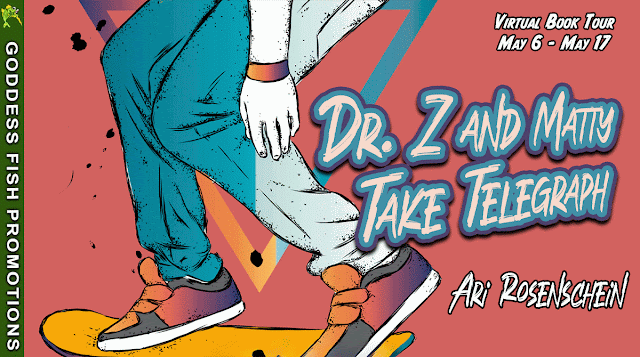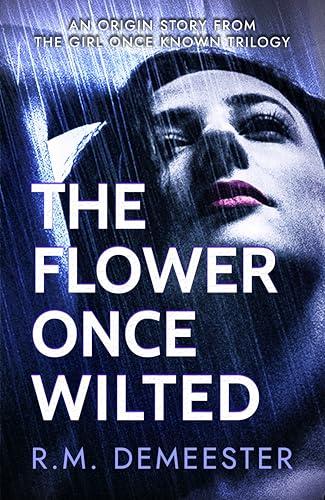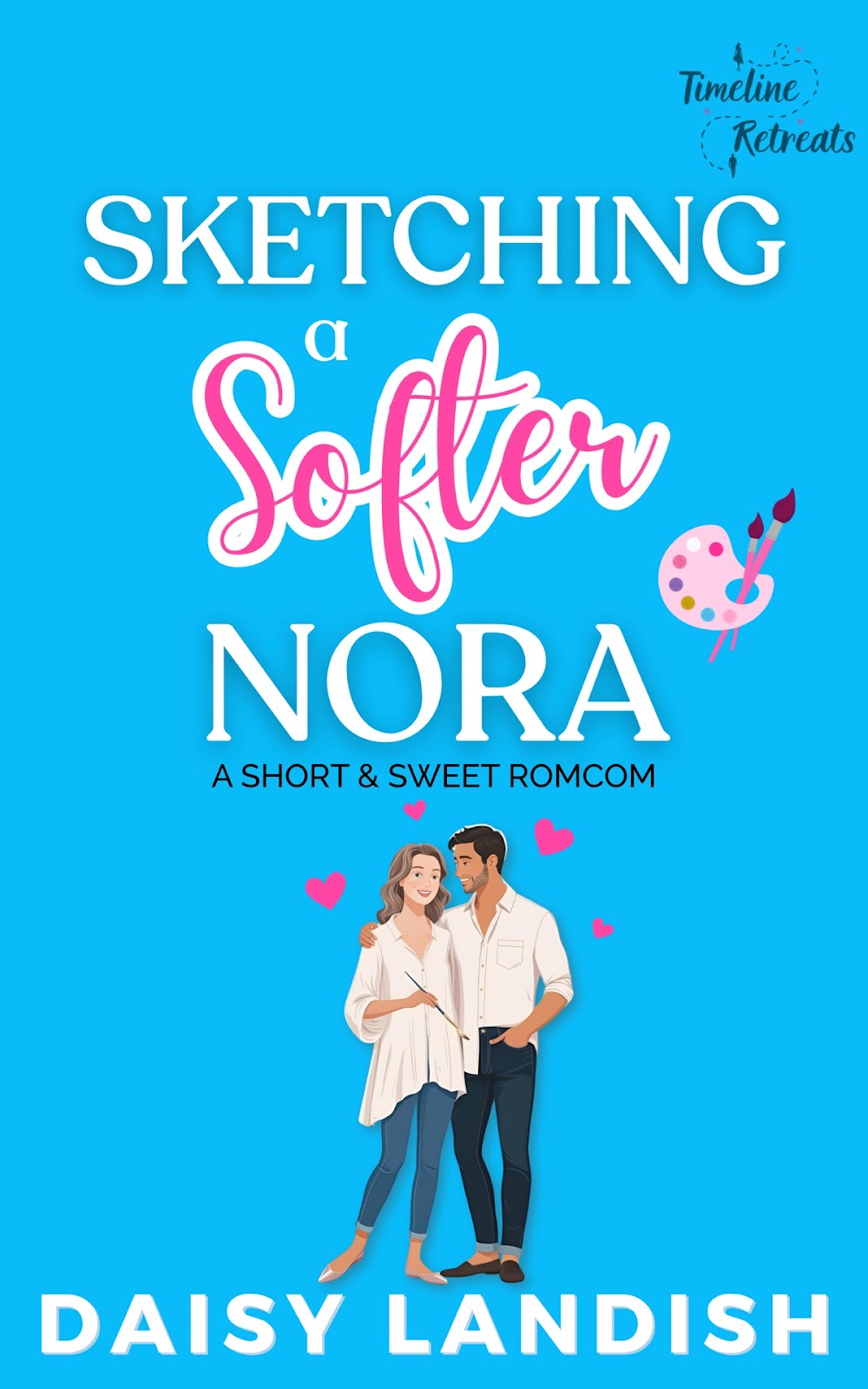DR. Z AND MATTY TAKE TELEGRAPH
Ari Rosenschein
GENRE: Young Adult
BLURB:
It’s the late ’90s—the final days before smartphones and the internet changed the teenage landscape forever. Zack and his mother have moved from Tempe to Berkeley for a fresh start, leaving behind Zack’s father after a painful divorce. A natural athlete, Zack makes the water polo team which equals social acceptance at his new school. Yet he’s more drawn to Matthias, a rebellious skater on the fringes, who introduces him to punk rock, record stores, and the legendary Telegraph Avenue.
As their friendship intensifies, Matthias’s behavior reminds Zack of his absent dad, driving a wedge between him and his mother. Complicating matters is Zaylee, a senior who boosts Zack’s confidence but makes him question his new buddy, Matthias. Faced with all these changes, Zack learns that when life gets messy, he might have to become his own best friend.
Dr. Z and Matty Take Telegraph is about how a friendship can challenge who we are, how we fit in, and where we’re going.
Purchase DR. Z AND MATTY TAKE TELEGRAPH @ Amazon
Excerpt:
We spend the rest of the afternoon messing around on Telegraph. I even take a brief spin on Matthias’s skateboard as a joke. I’ve got decent balance from wrestling, so I make it a whole city block. I kick the deck when I disembark, imitating how I’ve watched Matthias do it.
“Not bad, Dr. Z. Not bad at all.”
Like I said, I pick up athletic stuff fast.
And it turns out Anthony the gutter punk isn’t the only character Matthias knows. Every few feet, we run into a grommet, a punk, and even normal kids from school, all falling over themselves to praise Matthias for his skating.
He’s a star, and with my build, I feel like a personal bodyguard, someone cool and important.
It’s going great until I see a street clock. “I’m supposed to meet my mom back on campus at three.”
“Or what, you turn into a pumpkin?”
“No, it’s just—”
“I’m joking, Dr. Z.” Matthias pulls me in for a hug and I stiffen. I guess I’m not used to that kind of contact outside of sports.
“Do your thing,” he says. “But make sure to listen to both those CDs tonight. That’s your homework.”
“You know I will. See you at lunch on Monday.”
On my jog back, I pass the same funky boutiques and eateries, the bag with my poster and contraband whacking my side in rhythm with my breath. I’m no longer worried about the CD heist or the awkward hug. That unfamiliar contentment from this morning is back. I feel alive.
Interview with Ari Rosenschein
Have you read anything that made you think differently about fiction?
So many books have shifted my understanding of what fiction can do, accomplish, and look like. In the YA world, the screenplay format of Monster by Walter Dean Myers is a powerful book that riveted students when I used to teach. Duplicity, by my Antioch mentor Peter Selgin, is an absolute mind-melter—a Memento for the literary fiction set. Most recently, Monica by Daniel Klowes took me to places that exist outside of genre definitions like “graphic novel” or “thriller.”
How do you select the names of your characters?
Character names are so funny. Sometimes, they just hit right immediately, and other times, I have to try many different ones to get to a character’s true name. In the case of Dr. Z and Matty Take Telegraph, I loved that Zack and Zaylee both have “z” names, and Matthias just felt right immediately. There is another book I’m working on where I’ve changed the names so many times, and with those changes often come significant background adjustments. In the end, when a name is the right one, I can feel it, especially in how it sounds coming out of other characters' mouths.
Do you hide any secrets in your books that only a few people will find?
I love throwing less common band names and pop cultural references into books. It’s a holdover from my music journalism days when I was constantly trying to bowl people over with obscure allusions. It gives me a little burst of sunshine that I was able to cram Drive Like Jehu, Pansy Division, Seven Years in Tibet, and Luniz into Dr. Z and Matty Take Telegraph alongside some of the more prevalent ’90s cultural touchstones like Nirvana and Titanic.
What was your hardest scene to write?
Without giving away any spoilers, some conversations between Zack and Matthias when their friendship is hitting rocky waters were extremely challenging. While the book isn’t entirely autobiography at all, everything I write pulls elements from my life, even if they are in minor ways. So, it wasn’t that those scenes were so tricky to write in terms of getting words on the page. Instead, it was the lifetime of tough talks I’ve had with friends that those types of scenes brought up. Recalling some of my own mistakes and immaturity is never easy. Still, bringing my emotional memory into my work makes for a more resonant result, even if the process isn’t always pleasant.
Do you want each book to stand on its own, or are you trying to build a body of work with connections between each book?
Related themes run through both of my published books—Coasting and Dr. Z and Matty Take Telegraph—and I love the thought of creating an oeuvre with interconnections that reward readers. That said, Dr. Z is a young adult book, and while adult readers who dug Coasting could certainly find it entertaining, I don’t think it works both ways.
My short story collection is decidedly not for young readers. In some ways, Dr. Z and Matty Take Telegraph offered me a chance to address some of the same themes as Coasting and other short fiction I’ve written, but in a more widely accessible way.
What were your goals and intentions in this book, and how well do you feel you achieved them?
I began working on Dr. Z and Matty Take Telegraph in the heart of the pandemic, and I could not fathom writing about the present moment. I felt I didn’t have a clear enough idea about where things were going or what the future held, so it was my goal to write something from a nostalgic place, but one that wasn’t exactly my childhood era.
My other hope was to create a book that gave me some of the same feelings I got from my favorite YA of my childhood—books like The Outsiders, various Norma Klein books, and A Separate Peace. I hold those books in such high regard that putting my work in the same breath is difficult. However, I know that I scrutinized and rewrote Dr. Z and Matty Take Telegraph over and over and sought to create something authentic, a book that could potentially exist outside of our exact cultural moment and be long-lasting. I believe I may have achieved that to some degree. I hope so.
What inspired you to write Dr. Z and Matty Take Telegraph?
Books about male friendship, like The Chosen by Chaim Potok, have always been meaningful to me. I kept referencing Potok's book early in the writing process for Dr. Z and Matty Take Telegraph. The measured way The Chosen builds in intensity and shows two boys learning about one another’s worlds was an inspiration to me for sure. On a personal level, I wanted to pay tribute to all the friends who have shaped me from a young adult to the person I am today. You know who you are.
Can you tell us a little bit about the next books in Dr. Z and Matty Take Telegraphor what you have planned for the future?
I am working on a book about the Seattle tech world that is nearing my first stage of completion, which means I’m ready to begin showing it to trusted readers, agents, and independent publishers. That project has been in process on and off since 2018. In addition, I have a pair of book concepts I’m over the moon about but will have to wait for their respective turns in the queue.
Can you tell us a little bit about the characters in Dr. Z and Matty Take Telegraph?
There are many essential characters in Dr. Z and Matty Take Telegraph, but the primary ones are Zack, Matthias, and Zaylee. Zack is a sophomore who moves from Tempe to Berkeley with his divorced mother and has to find a way to fit into a brand-new environment. Matthias is the off-the-wall skater who befriends Zack and reveals an entirely fresh scene to him, one filled with alternative culture and punk rock music. Finally, Zaylee is a senior whom Zack falls for in the book. She is politically active and possesses a degree of maturity that knocks him off his feet.
What did you enjoy most about writing this book?
Exploring the present tense, first-person voice of Dr. Z and Matty Take Telegraph was a new experience for me, and the general pace of YA fiction was exciting. There were also restrictions and conventions that forced me out of my habit and into new territory. Most of all, I also found it satisfying to lean into the melodramatic parts of my personal young adult experience. I guess I’m an eternal teen.
AUTHOR Bio and Links:
Ari Rosenschein is a Seattle-based author who grew up in the Bay Area. Books and records were a source of childhood solace, leading Ari to a teaching career and decades of writing, recording, and performing music. Along the way, he earned a Grammy shortlist spot, landed film and TV placements, and co-wrote the 2006 John Lennon Songwriting Contest Song of the Year.
In his writing, Ari combines these twin passions. Coasting, his debut short story collection, was praised by Newfound Journal as “introducing us to new West Coast archetypes who follow the tradition of California Dreaming into the 21st century.” Dr. Z and Matty Take Telegraph (Fire & Ice YA) is his first young adult novel.
Connect with Ari Rosenschein
Website ~ Facebook ~ Instagram ~ TikTok












%20by%20Willow%20Thorne.jpg)































3 comments:
Thank you so much for hosting today - it's appreciated.
Great interview! This looks like a great novel. Thanks for sharing.
Sounds like a good book.
Post a Comment